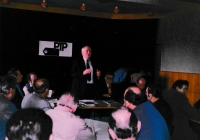At eight o’clock in the camp, have dinner and go work the shift

Download image
Oldřich Richter was born on May 20, 1930. In the post-war years, he graduated from the grammar school in Klatovy and then began studying medicine at the Faculty of Medicine in Pilsen. After two years, in the autumn of 1951, he enlisted in auxiliary technical battalions. He spent the first month working in the Karviná coal mine Mír (now the Gabriela mine), followed by two years of forced labour in the military camp in Ostrava-Radvanice near the Ludvík coal mine. He returned from the technical battalions in 1953. He later completed his university studies and became a doctor. At the time of filming the interview (2016), Oldřich Richter was living in Zelená Lhota in the Klatovy region.
